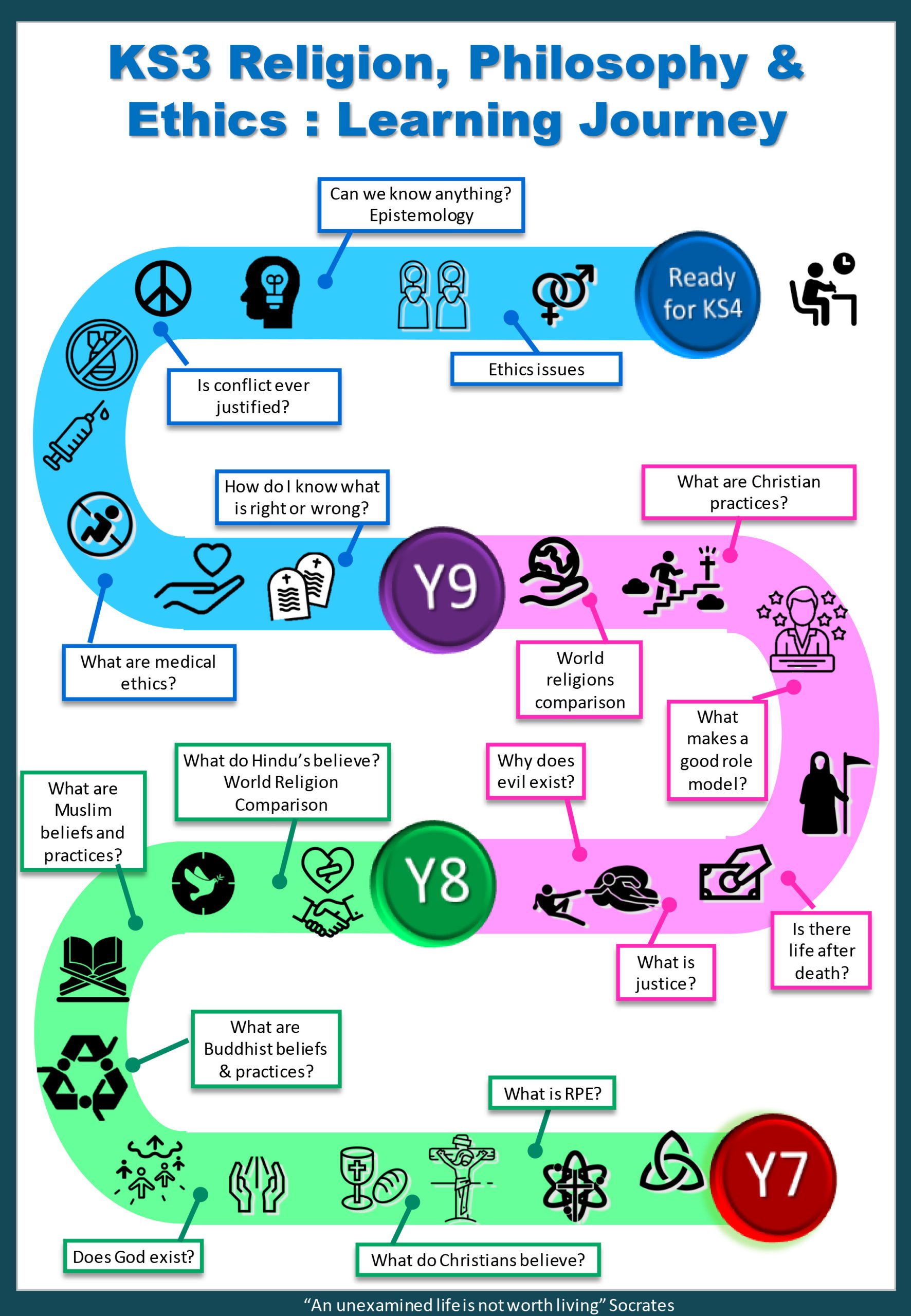Year 7
We begin the year focusing on the difference between religion, philosophy and ethics, introducing the importance of RPE as well as how it links to skill and career development. Students complete at least one lesson on each concept and reflect on their own religious, philosophical and ethical beliefs – this enables us to gain a greater understanding of the knowledge and skills baseline our students join us with. The second unit focuses on the concept of “God” and arguments for existence, this is important due to the predominantly secular nature of many classes within which students fail to comprehend why people are religious. Subsequent topics explore the fundamental beliefs and practices of Christianity, Islam, Buddhism and Sikhism. Each unit develops from substantive knowledge including “ways of knowing” within this religion to reflection on the significance, impact and importance of these beliefs and practices and finally, ending with, personal reflection utilising the AO2 requirement of “learning from religion”. To complete the AO2 requirement students will reflect on how they may live in similar ways, critique the religious values and address their own presuppositions or misconceptions.
Year 8
In the second year of KS3, students will deepen their understanding of religious belief, ethical theory and philosophical enquiry beginning with the unit “why does evil exist?”. This unit develops upon the knowledge learnt in units 2 and 3 of year 7 but enables students to apply their knowledge to an ancient philosophical question. Students engage well with learning about this topic first in year 8 as it allows for much debate and sets challenging expectations but focuses only on one religion so eases them into the year.
The second unit debates the possibility of afterlife and educates students on religious and secular concepts that require a level of maturity to prevent fear (e.g. of hell) and enable informed reflection. It is followed by an ethical unit on justice and late a unit on right and wrong which again requires maturity as they deal with issues such as the death penalty. These topics have been selected for these points in year 8 because it is often at this time in their lives when students desire a level of independence they have yet to be granted and as such issues around morality and justice are of great interest to them. These topics also prepare them for profound debates and deep thinking utilising scholars for sources of wisdom but without being too sensitive for their age. Also within year 8, students will further develop their knowledge of Islam by studying Muslim practices – this ensures they have a broader understanding and tolerance for different beliefs and values but also gives them more foundational knowledge to draw from when studying ethical and philosophical topics.
Year 9
In the third year of KS3, students begin with two challenging but engaging ethical topics. The first unit debates morality, it teaches a range of religious and non-religious views on right and wrong, and it utilises current affairs for engagement. The second unity is about medical ethics, it teaches about the nature of, and different beliefs regarding organ donation, abortion, IVF and euthanasia. These lessons help students recognise the practical application of RPE in careers as well as identifying skills that are transferable thus it is an ideal time to teach them prior to GCSE options being selected. Students also require a level of maturity and prior RSE knowledge that means such topics would not be appropriate in year 8. Unit three in year 9 focuses on war and conflict, applying a range of religious and non-religious perspectives on issues of war and peace. Students continue to utilise their higher order thinking skills and build on their prior knowledge of religious beliefs by focusing more closely on denominational differences. Preceding this topic are units on epistemology and equality – both of which enable students to develop greater understanding of sources of wisdom and further opportunity to reflect on their own beliefs.
At the end of Year 9 it is felt that students are well prepared to continue their studies at GCSE level and if they have not selected RS at GCSE they will continue, through the RS pastoral curriculum, to develop important skills and knowledge to support community cohesion, promote tolerance, ensure the core RPE skills such as self-reflection and empathy continue to be developed.
Homework: A variety of activities are set in RPE. Such as, reflections, research, extended answers, project work and revision using knowledge organisers.
